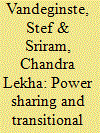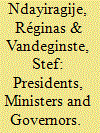| Srl | Item |
| 1 |
ID:
108962


|
|
|
|
|
| Publication |
2011.
|
| Summary/Abstract |
Recent peace negotiations practice has given rise to the emergence of two paradigms. In line with normative developments in global human rights protection, internationally brokered peace processes often address the options for accountability for abuses committed in the past and generally cannot include blanket amnesties. At the same time, many agreements end armed conflicts by offering power-sharing incentives for warring parties. In most cases, power-sharing arrangements are likely to clash with attempts to meaningfully deal with truth, accountability, and reparation for past abuses. The tension between the two paradigms gives rise to a number of important challenges and constraints for policymakers and, thus far, there is little practical evidence to guide them in managing the clash.
|
|
|
|
|
|
|
|
|
|
|
|
|
|
|
|
| 2 |
ID:
108270


|
|
|
|
|
| Publication |
2011.
|
| Summary/Abstract |
This paper analyses the local, presidential and legislative elections that took place in Burundi between May and September 2010. Electoral results are presented, analysed and interpreted against the background of Burundi's constitutional consociational power-sharing regime. The power-sharing arrangement, which was negotiated during Burundi's recently completed peace process, saved the pluralistic nature of the elections but may itself fall victim to the outcome of these same elections, with the dominant party CNDD-FDD obtaining an overwhelming majority in parliament and controlling most of the instruments needed to further establish its hegemony. Political pluralism, both within and outside the institutions, is under threat. As evidenced by developments in the early aftermath of the electoral marathon, conjunctural alliances between opposition groups and the incumbent regime's increasingly authoritarian response to dissidence may well result in renewed instability and insecurity.
|
|
|
|
|
|
|
|
|
|
|
|
|
|
|
|
| 3 |
ID:
190078


|
|
|
|
|
| Summary/Abstract |
Building on an original dataset, this paper explores the evolution of the consociational power- sharing at critical junctures in Burundi. Covering almost two decades of power-sharing practice (2001–2020), this paper analyzes the allocation of high salience ministerial portfolios and of provincial governor positions along ethnic lines. The paper shows how quotas matter and how a changing political context affects the real life implementation of Burundi’s negotiated power-sharing arrangements. We argue that dominant political actors take advantage of loopholes in the design of power-sharing institutions in order to enhance their access to important political positions.
|
|
|
|
|
|
|
|
|
|
|
|
|
|
|
|
| 4 |
ID:
188773


|
|
|
|
|
| Summary/Abstract |
Using a lifecycle perspective, this paper analyzes the use of reserved seats and the evolution of cooptation norms and practices in Burundi between the signature of the Arusha Peace and Reconciliation Agreement in 2000 and the 2020 legislative elections. Value-driven objectives, such as minority protection, only partly explain their use and design. The adoption, functionality and recent transformation of electoral cooptation were also determined by realpolitik, most notably by the elites’ struggle for positions and the balance of power. Cooptation had important effects on ethnic cohabitation within parliamentary factions. The paper contributes to the literature on the micro-institutions of power-sharing.
|
|
|
|
|
|
|
|
|
|
|
|
|
|
|
|